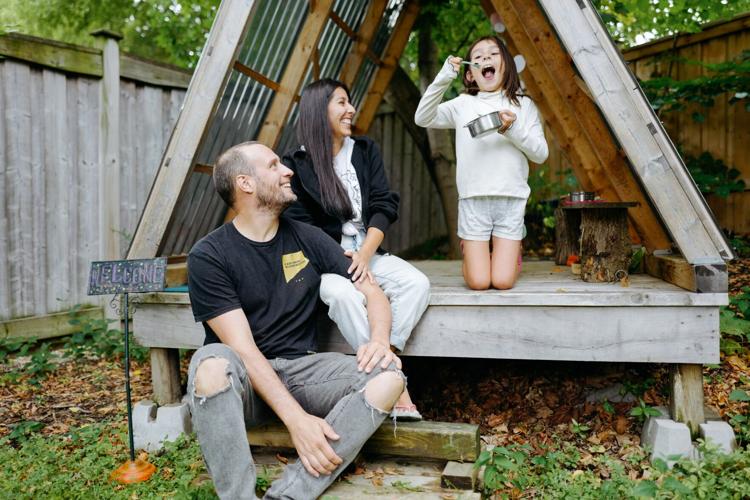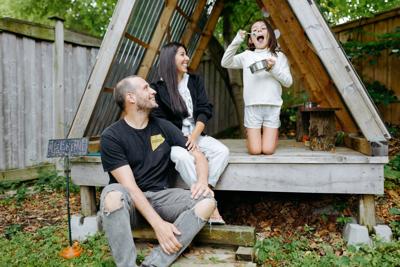Quentin de Becker’s daughter Lou isn’t quite ready to give up her toothpastes themed with some of her favourite films.
Buying the eight-year-old “Minions” or “Frozen” toothpaste rather than refilling a plain glass container is just one of the ways de Becker and his wife, Cristina Cornejo, try to meet their daughter halfway. Lou is still learning the value of reducing waste in their household.
“It’s been a bit rocky to encourage her to understand the virtue of the zero waste movement,” de Becker said. “But there’s a feeling of accomplishment and fulfilment that you get from small changes in your home and to see the size of your (garbage) bins decreasing.”
è¨è¨âý is expected to run out of landfill space for its garbage by 2035. Recycling only gets households so far andä»recyclables from public litter bins are rarely diverted. While the city is trying to move toward a more circular economy whereä»products are renewed, reused and recovered as part of its long-term waste management strategy, it describes a zero-waste future as “aspirational.”
è¨è¨âýnians dedicated to reducing their household waste agree: generating zero garbage is not realistic. Still, some say the best way individuals can contribute to the city’s goals is by not buying excess packaging in the first place and reusing what materials they can. The goal isn’t to be perfect, they said, but to pull together and do their part while city hall does its part.
è¨è¨âýnians that the Star spoke with have chalked up how they manage minimal waste to a few factors: lot of conscientiousness and perseverance, a bit of planning and creativity, and a dab of compromising where needed.
A more realistic approach
Producing zero waste is especially difficult in a city, said Michelle Genttner, who grew up in farming areas with a conservation mindset. Zero waste can be a goal, she said, but it’s more realistic to aim to avoid single-use plastics and excess packaging wherever possible, orä»buy packages that come in aluminum, paper or glass, which have the highest levels of recyclability.
“It’s as simple as just being aware of what you’re buying and why,”ä»Genttner said. “Why do we use fabric softener sheets? They’re not good for you. Why have we been told that clean needs to have a smell?”
Genttner ownsä»Unboxed Marketä»in Little Portugal,ä»a plastic-free and package-free store meant to help è¨è¨âýnians reduce their household waste, and she frequently shops from it herself. Customers can buy items in bulk, refill toiletry products like shampoo or laundry detergent, grind their own peanut butter into reusable containers and weigh containers brought from home before filling them with dry goods or poultry.
“Don’t try to fix or change everything all at one time. It’s overwhelming,” Genttner said. “It’s often easier if you start with one area of the home.”
Little changes can add up
For Tyler Rooney, even if it’s one part of the home, changing the products you use and how or where you shop can require perseverance at times and the willingness to tolerate a trial-and-error phase.

De Becker, left, and Cornejo in their kitchen. A important part of the familyãs minimal-waste lifestyle is using reusable containers for food.
Michelle Mengsu Chang è¨è¨âý St“Trying to buy (quality) deodorant that’s not in plastic containers is pretty hard,”ä»Rooney said. “There were brands I tried that went out of business. Then you try something else and you’re like, ‘Oh, this is just not a good product.’”
There can also be a time suck involved with reducing waste, like going to the bulk store for certain items, then going to the farmer’s market for others, said Jennifer Bartoli.
“But I think if you’re dedicated to making a change, it kind of becomes bigger than the sum of its parts.”
Cutting waste can cut costs
Genttner says that reducing waste can also save you money when, for example, you buy items in bulk. Or you grind your own coffee beans at a store with refillable glass jars to then make coffee at home and carry in a thermos rather than buying at coffee shops regularly.
Chantal Stepa, however, finds that affordability depends on the product and place. For example, she said, low-waste stores can be more expensive than large grocery stores because they put in the effort to ensure they’re sourcing ethical and sustainable products so it’s biodegradable or produced locally.
“So you can end up paying a little bit more because of the quality of the product,” Stepa said. “But I find shopping at farmer’s markets I’m not spending more because I’m buying exactly what I need.”
For Bartoli, creativity and resourcefulness also help, such as encouraging her two kids, aged 4 and 6,ä»to get artistic with pamphlets or old egg cartons. As a family, she said, they’ve cut out magazines into flowers and decorated her kids’ bedroom door, and they recently created a dollhouse-sized haunted house from pieces of cardboard.ä»
Pantry penny-pinching
Bartoli has monthly calendar reminders for herself to take stock of her pantry as well so she doesn’t buy what she doesn’t need and she abides by an old restaurant rule “first in, first out” to make sure her older groceries are consumed first.
Bartoliä»said she incorporates into new recipes parts of produce commonly thrown away, such as broccoli stalks (which she said make for a tasty slaw or an addition to cooked pasta) or carrot greens (which she said she sautûˋs and adds to a variety of entrees).
“There’s also a huge market in è¨è¨âý for second-hand clothing shops, especially for young children,” Bartoli said, adding those shops can be cheaper than buying new. “There are so many items you’ll be able to find that are oftentimes so new the tags are still on them.”
Striking a compromise
Then there are other lifestyle choices that force people to keep the same amount of waste in one area of their life, like owning specific pets.
è¨è¨âý’s landfill is nearing capacity and the First Nation living next to it wants it shut down. Finding a solution won’t be easy.
è¨è¨âý’s landfill is nearing capacity and the First Nation living next to it wants it shut down. Finding a solution won’t be easy.
“I did have a cat before,” said Stepa. “Things like cat litter or cat food are almost impossible to find in bulk ... Or if your pet is on a specialty diet, you have to get that food from the vet and it’s going to come in large plastic bags.”
Sometimes other compromises are a must, even if you can generate less waste, because the effort to do so proves to be too inconvenient.
“When our first kid was born, there was cloth diapers and that was definitely a lot,” Rooney said. “We still used disposable diapers for infants overnight, because logistically it was not worth the trade off in terms of losing more sleep.”
Quentin de Becker andä»Cristina Cornejoä»know all about trade-offs. They still buy Lou her favourite toothpaste, but de Becker said they’ve taught herä»to replace plastic water bottles with reusable ones and to be amenable to second-hand clothing from Value Village.
“The other day, I forgot to bring my water bottle in the heat, so I had to get a plastic one and my daughter said, ‘Oh, what! Papa! You’re using plastic!’”ä»de Becker said. “It was really sincere.”
“On the other end of that, (my daughter) will make it a point to say she wants to buy plastic water bottles when she’s mad at me.”
10 tips for a ‘zero waste’ life
1. Shopping at farmer’s markets lets you control the amount of fresh herbs you buy, rather than leaving grocery stores with excessive bunches.
2. Refill your toothpastes, shampoos and conditioners in glass containers at package- or plastic-free stores that offer fill ups.
3.ä»Switch from plastic-lined tea bags to loose-leaf tea and reusable infusers.
4. Use reusable water bottles instead of plastic bottles and thermoses with homemade coffee instead of buying coffee with plastic cups.
5. Donate your old clothes and toys; buy new ones from thrift stores or second-hand shopsä»and bring your own reusable bags.
6. Give old items new life by visiting repair cafesä»or repair eventsä»to extend the life of items like clothing, appliances and electronics.
7. Reuse containers like jam jars, cookie tins and yogurt containers for storage.
8. Turn old clothing you can’t donate into rags to clean with.
9.ä»Borrow or rent items you don’t use often like party supplies or board games.
10.ä»Bring reusable containers from home when dining out in case you have leftovers.


































To join the conversation set a first and last name in your user profile.
Sign in or register for free to join the Conversation